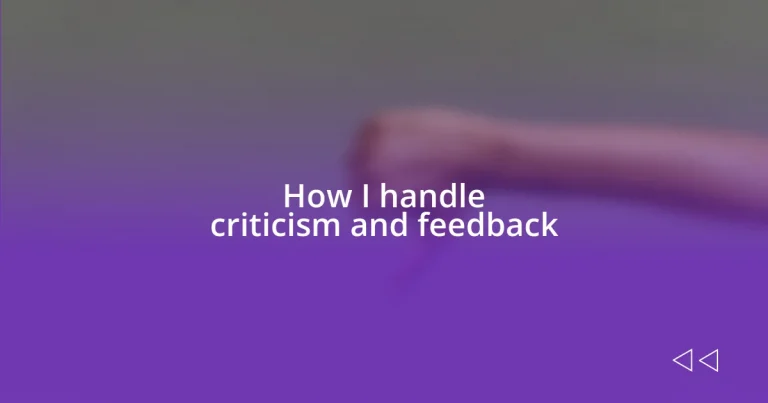Key takeaways:
- Recognizing the intent behind criticism can transform it into a valuable tool for personal and professional growth.
- Engaging with feedback through curiosity, active listening, and gratitude fosters better outcomes and strengthens relationships.
- Maintaining a positive mindset helps to navigate criticism, turning challenges into opportunities for learning and resilience.
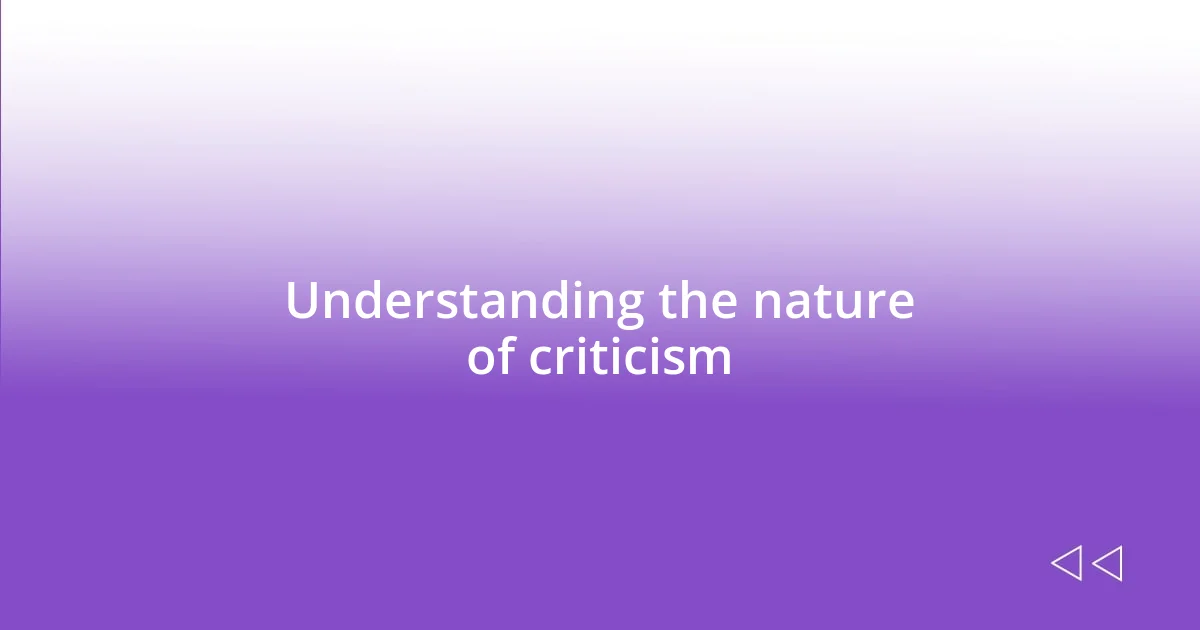
Understanding the nature of criticism
Criticism often gets a bad rap; it’s easy to view it as a personal attack rather than a tool for growth. I remember a time when I poured my heart into a project only to be met with harsh feedback. Initially, my instinct was to feel defensive, but I soon realized that understanding the intention behind the critique could lead to personal and professional growth. Isn’t it worth considering whether the comments stem from a desire to help rather than hurt?
One crucial aspect of criticism is its subjectivity. What may feel like a glaring flaw to one person might not even register with another. I’ve been in meetings where feedback felt contradictory; some appreciated my creative flair, while others thought it went too far. This duality prompted me to ask myself: how do I filter through varied opinions without losing my essence?
By embracing criticism as a reflective mirror, I learned to distinguish valuable insights from noise. I’ve felt the sting of dismissive comments, but when I actively sought the constructive elements, I discovered a pathway to improvement. This shift in perspective transformed my relationship with criticism. How do you perceive the comments made about your work—could viewing them as opportunities rather than setbacks change your approach?
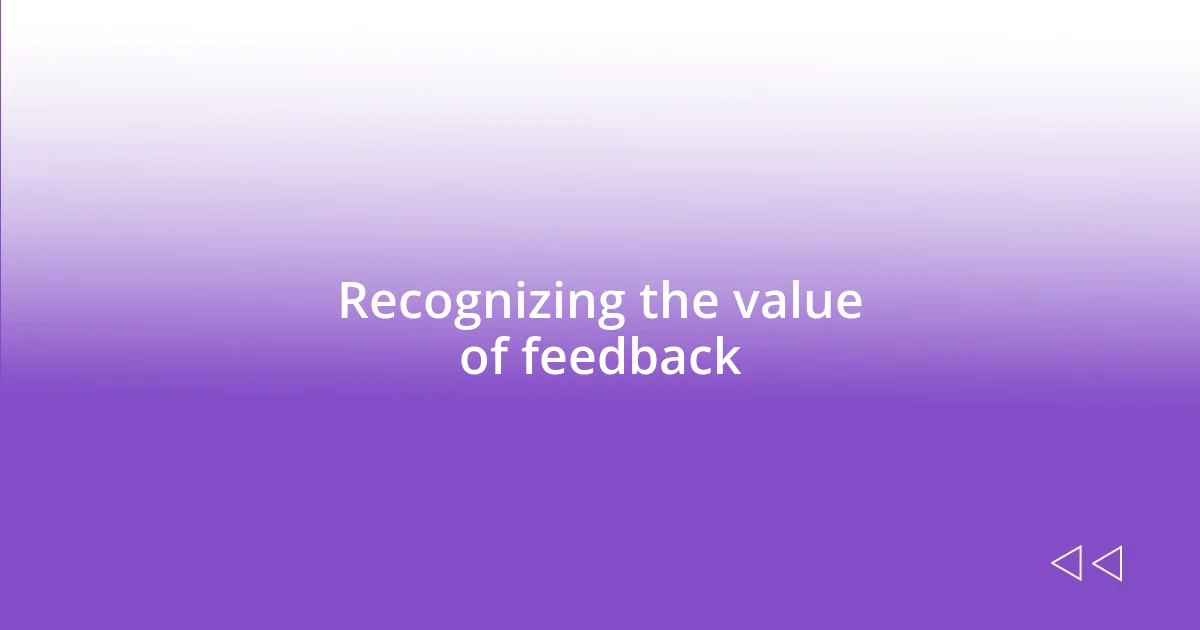
Recognizing the value of feedback
Feedback is like guidance on a journey; it often points out paths we may not have considered. In my experience, when I receive feedback, I try to view it as an outsider’s perspective on my work. For instance, after presenting a proposal at work, I was stunned to receive critique that highlighted areas I hadn’t fully developed. At first, it felt disheartening, but eventually, I recognized that these insights were invaluable to refining my ideas. The phrase “what doesn’t kill you makes you stronger” rings true here—feedback fortifies our skills and enriches our understanding.
Moreover, I’ve found that recognizing the intent behind feedback is key to harnessing its potential. Once, a colleague offered feedback that was tough to digest; it stung because I highly respected her opinion. However, taking a step back, I realized she wanted to push me toward excellence rather than criticize for the sake of it. This realization shifted my mindset, allowing me to extract practical advice rather than dwell on the delivery. I invite you to reflect: how often do you view feedback through a lens of growth instead of adversity? It’s a transformational approach that opens doors.
When we engage with feedback, we not only elevate our work but also nurture our resilience. I recall a time I presented a passion project, and the feedback that felt overwhelmingly critical became transformative. By focusing on the constructive elements and seeking clarification, I turned uncertainty into a plan of action. Embracing feedback cultivates a rich learning experience that ultimately propels us toward our goals—each comment is a stepping stone in our personal and professional development.
| Positive Aspects of Feedback | Negative Aspects of Feedback |
|---|---|
| Encourages improvement | May feel personal |
| Offers new perspectives | Can be vague |
| Promotes resilience | Requires emotional maturity |
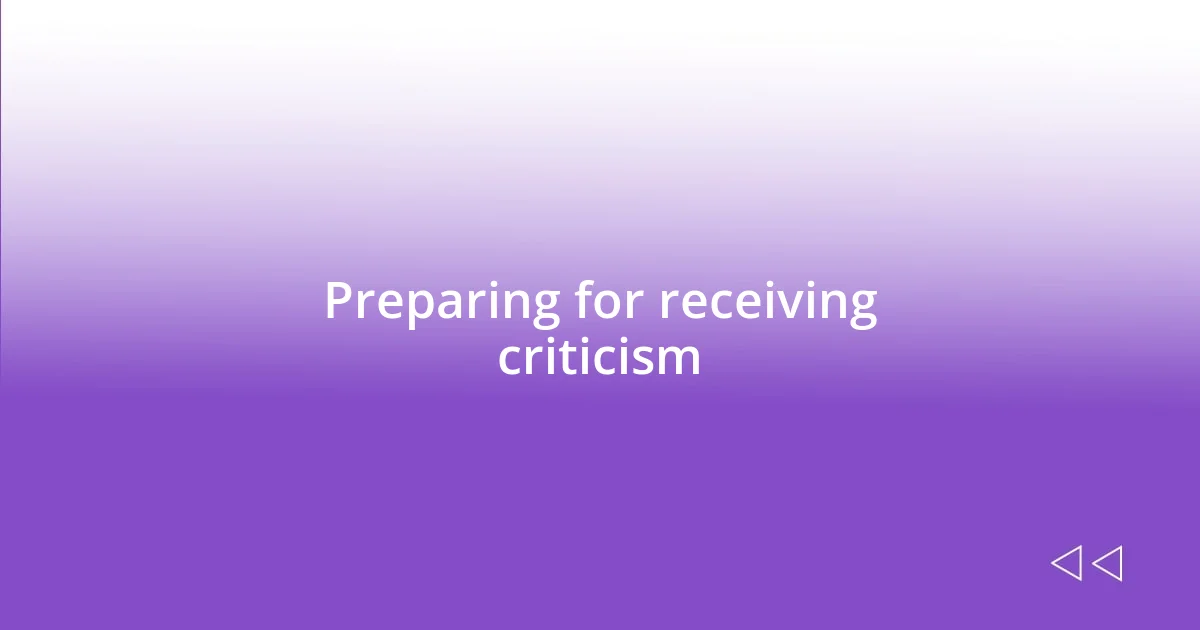
Preparing for receiving criticism
When preparing to receive criticism, I find it incredibly helpful to mentally gear myself up beforehand. Reflecting on my past experiences, I recall a presentation where feedback felt like a wave crashing down. I realized that anticipating feedback can soften its impact. To make this process smoother, I focus on a few key strategies:
- Remain open-minded: I remind myself that feedback isn’t a personal attack. It’s meant to help me grow.
- Practice active listening: During feedback sessions, I pay close attention to the giver’s words without interrupting. It helps me absorb their message fully.
- Take notes: Writing down feedback can provide clarity and serve as a reference for future improvements.
Creating a mental space for receiving criticism is just as critical. I often visualize myself embracing feedback as a gift—something that can broaden my understanding. Once, after receiving a tough critique from a mentor, I took that moment to breathe deep and remind myself that their goal was to guide me. It transformed my anxiety into curiosity—I wanted to uncover all possible insights from that experience. Preparing my mindset this way turned potential conflict into a collaborative discussion.
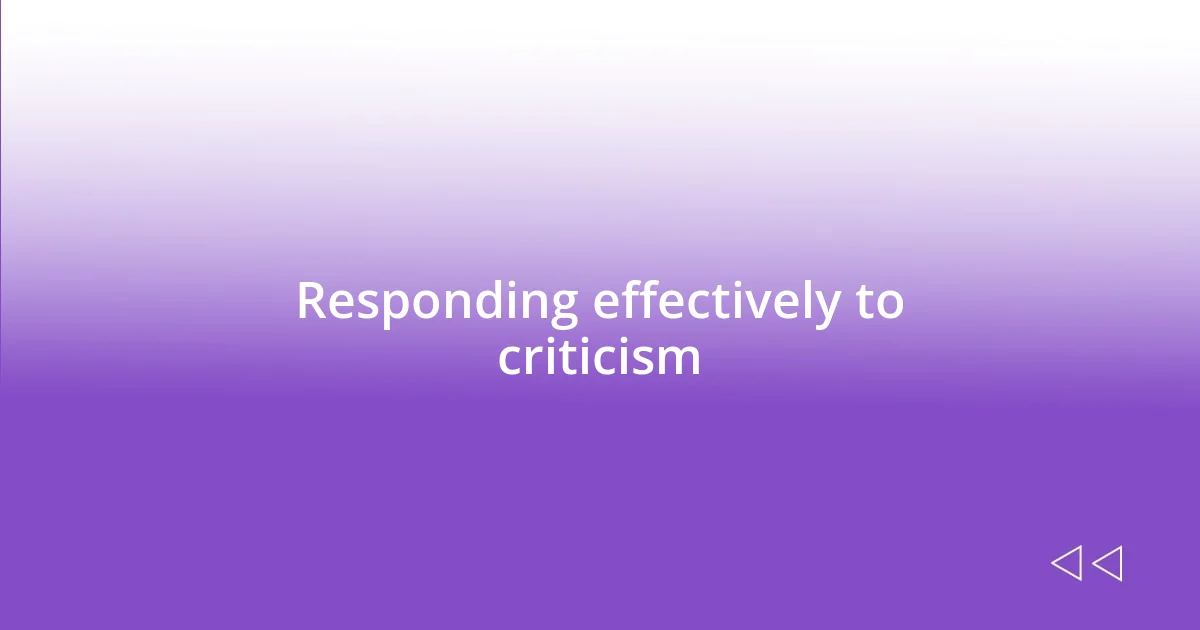
Responding effectively to criticism
When I first encounter criticism, my immediate reaction is often surprise mixed with a touch of defensiveness. I always remind myself to take a breath and pause. For instance, after a team project, a colleague pointed out some oversights I had missed. Initially, I felt a surge of irritation, but I quickly shifted from focusing on my feelings to considering the constructive elements of his feedback. This small mental shift transformed my initial reaction into curiosity about how I could improve. Have you ever felt that twinge of defensiveness when receiving feedback? It’s perfectly natural, but embracing this discomfort can lead to growth.
I’ve learned that asking clarifying questions can be a game changer in my response process. After receiving feedback on a critical report, I found myself a bit lost in the comments. Rather than retreat into my shell, I asked for specific examples and suggestions on how to improve. The conversation transformed from daunting to collaborative, helping me gain valuable insights. Isn’t it fascinating how turning a moment of criticism into a dialogue can create opportunities for learning?
Throughout this journey, I’ve found that expressing gratitude towards the feedback giver fosters a positive relationship and opens future lines of communication. A simple “thank you for your honesty” goes a long way. In one instance, a senior manager once critiqued my approach to a presentation. Instead of withdrawing, I thanked her for her insights and shared my intention to incorporate her suggestions. Her surprise and appreciation created a stronger partnership moving forward. Isn’t it incredible how a positive response not only improves our own outlook but strengthens our professional bonds, too?
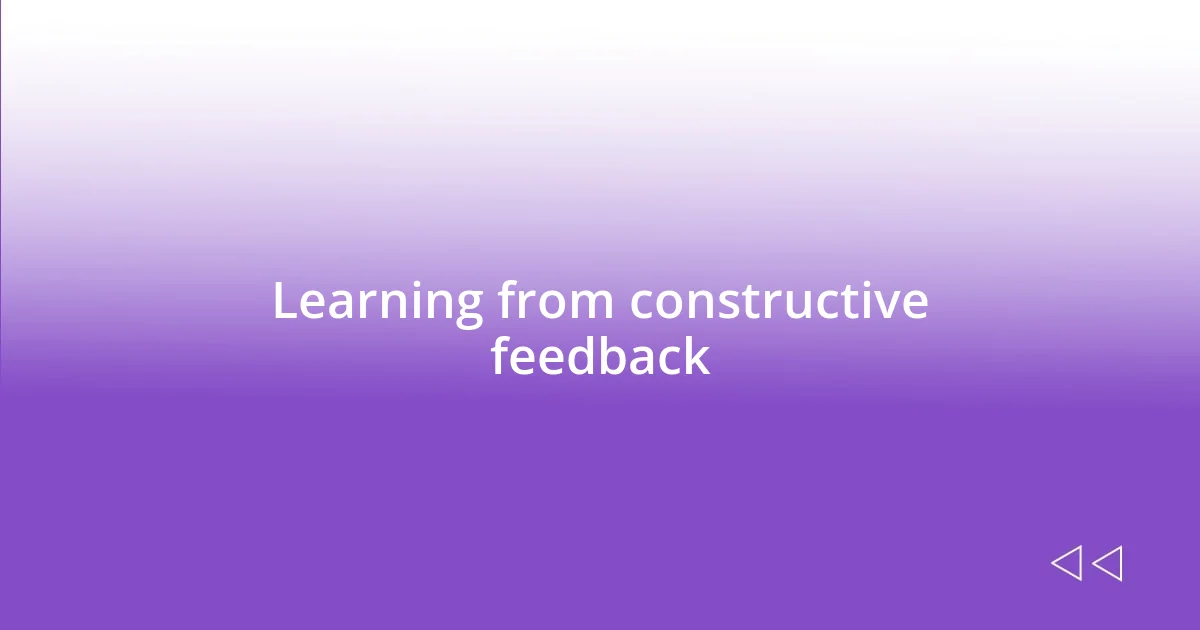
Learning from constructive feedback
Learning from constructive feedback is truly an art. Once, I received feedback on a marketing campaign I led. My first instinct was to defend my choices, but I paused and took a moment to reflect. That simple practice of reflection transformed my perspective; I started to see the feedback as a roadmap for improvement instead of a critique of my abilities. Have you ever felt that unexpected shift when you choose to listen rather than react?
Engaging with constructive feedback can be a turning point. I remember a time when I was struggling with my writing style during a project review. A colleague pointed out that my tone seemed too formal for our audience. Initially, I felt disheartened—but then I took a step back and asked for clarity. This approach not only revealed specific actionable suggestions but also fostered a collaborative atmosphere. It’s remarkable how breaking down feedback into manageable parts can illuminate paths for development.
In my experience, embracing feedback encourages a growth mindset. I vividly recall the moment a team lead offered me candid feedback about my presentation skills. Instead of brushing it off, I took that feedback to heart, practiced with peers, and sought out additional resources. The outcome? I delivered my next presentation with newfound confidence. Isn’t it rewarding to transform feedback into stepping stones toward your next achievement? When we actively learn from feedback, we build resilience and refine our skills, shaping a more rewarding experience in our professional lives.
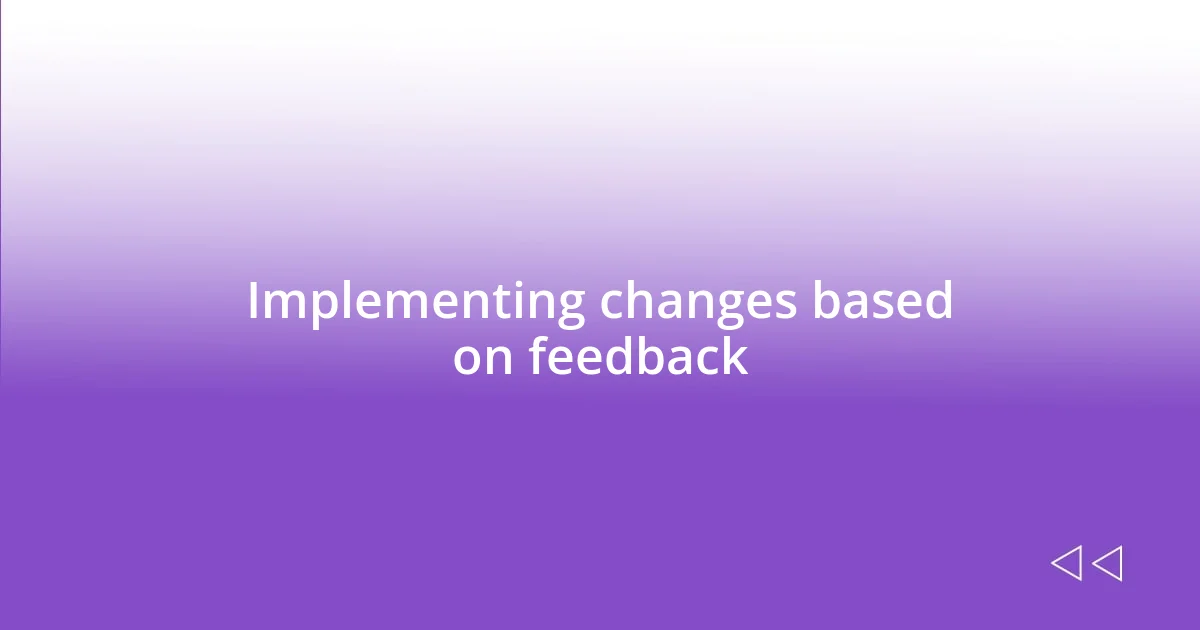
Implementing changes based on feedback
Implementing changes based on feedback can feel like a daunting challenge, but I’ve found that it’s truly a powerful opportunity for growth. When I revisited my approach to project management after receiving feedback, I realized I relied too heavily on my intuition. I decided to integrate structured planning into my workflow. This change not only helped me stay organized but also gained my team’s trust, knowing I was following a clear path. Have you ever tried shifting your methods based on outside input? It’s often the most rewarding step.
On one occasion, I received feedback from a mentor on my negotiation style. They pointed out that I often overlooked listening to the other party. I took this to heart and committed to changing my approach in our next discussions. To my surprise, pausing and genuinely considering the other person’s viewpoint led to more fruitful outcomes—and opened up discussions I hadn’t anticipated. It’s fascinating how simply adjusting our approach based on feedback can unlock new channels of communication, isn’t it?
Transforming feedback into actionable changes doesn’t always happen overnight. I remember a situation where I implemented a few suggestions from my peers regarding my coding techniques. Adapting to new practices took effort and patience, but over time, I noticed a significant improvement in my efficiency. I often remind myself that change is a process, not an event. Each step forward is a victory. How do you approach change after receiving feedback? Embracing adjustments can be a journey filled with learning and confidence.
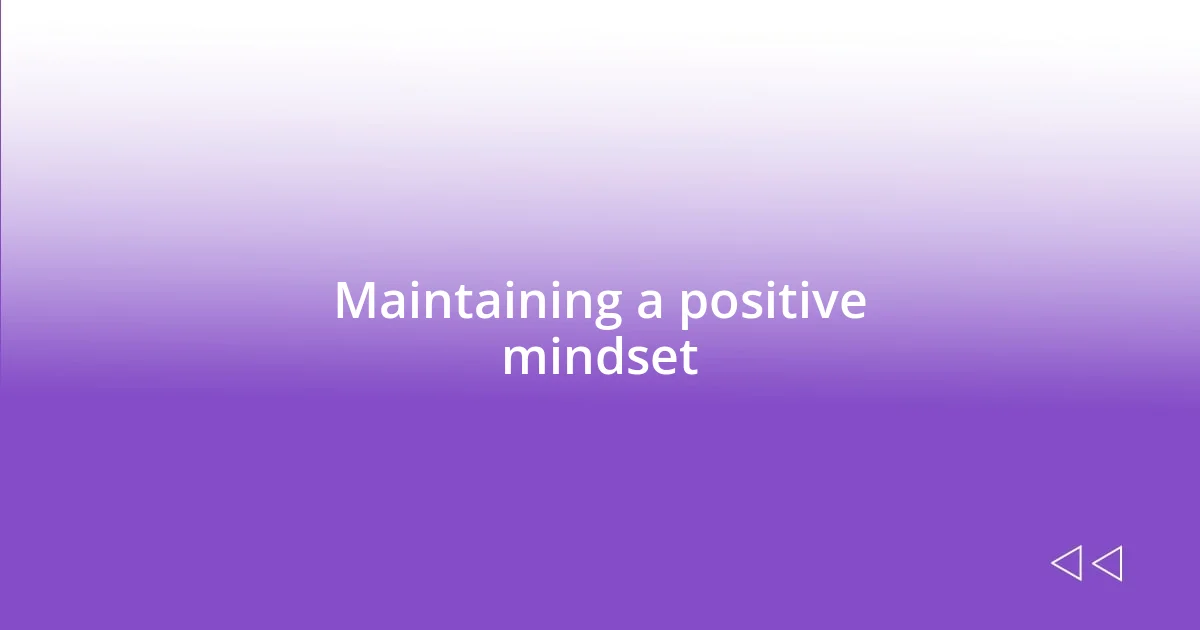
Maintaining a positive mindset
Maintaining a positive mindset can be incredibly transformative when facing criticism. I recall a time when I was part of a team project that went sideways. Initially, I felt frustration bubble inside me, but I made a conscious choice to view the situation as a chance to learn. In doing so, I realized that positivity isn’t just about avoiding negativity; it’s about actively seeking the silver lining, even in tough moments. Have you ever shifted your focus to the positives despite feeling overwhelmed?
I often remind myself that our thoughts shape our realities. There was an instance when I received some harsh feedback on a presentation I was really proud of. Instead of letting it weigh me down, I chose to see it as a catalyst for growth. I visualized my next presentation as an opportunity to put these insights into practice. This adjustment in perspective allowed me to bounce back more energized and motivated. Doesn’t it feel great when our mindset fuels our momentum forward?
Cultivating a positive mindset is a journey, not a destination. I remember catching myself dwelling on criticism during a period of intense project deadlines. Recognizing that habit, I set aside time to reflect on my achievements instead. Celebrating those small wins gave me the boost I needed. It serves as a gentle reminder that focusing on our progress can be the best antidote to negativity. How do you nurture your mindset during challenging times? Finding joy in our accomplishments can truly transform our outlook.












